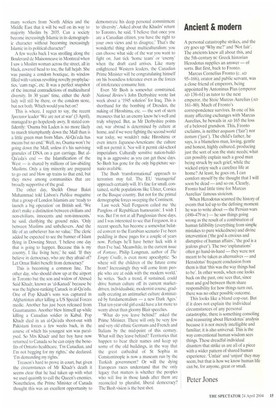Ancient & modern
A personal catastrophe strikes, and the et), goes up 'Why me?' and 'Not fair'. The ancients knew all about this, and the 5th-century BC Greek historian Herodotus supplies an answer — of sorts. But first, back to Fronto.
Marcus Cornelius Fronto (c. AD 95-166), orator and public servant, was a close friend of emperors, being appointed by Antoninus Pius (emperor AD 138-61) as tutor to the next emperor. the Stoic Marcus Aurelius (AD 161-80). Much of Fronto's correspondence survives. In one of his many affecting exchanges with Marcus Aurelius, he bewails in AD 165 the loss of a beloved grandson. This, Fronto exclaims, is neither aequum (lair') nor iusturn ('juse). The child's father, he says, is a blameless man, loving, gentle and honest, highly cultured, producing just the sort of son the state needs; what can possibly explain such a good man being struck by such grief, while the wicked enjoy such a carefree life at home? At least, he goes on, I can comfort myself by the thought that I will soon be dead — and so on. Clearly, Fronto had little time for Marcus Aurelius' famous stoicism.
When Herodotus scanned the history of events that led up to the defining moment he was to write about — the Persian wars (490-479 BO — he saw things going wrong as the result of a combination of human fallibility (everything from simPle mistakes to pure wickedness) and divine intervention ('the god is envious and disruptive of human affairs', 'the god is a jealous giver). The two 'explanations' often go hand-in-hand — they were not meant to be taken as alternatives — and Herodotus' frequent conclusion from them is that 'this was the way things had to be'. In other words, when one looks back on the past, one sees that, since man and god between them share responsibility for how things turn out, there was no other possible outcome.
This looks like a bland cop-out. But if it does not explain the individual circumstances of any personal catastrophe, there is something consoling and reassuring about Herodotus' analysis because it is not merely intelligible and familiar; it is also universal. This is the way conventional human wisdom sees things. These dreadful individual disasters that strike us are all of a piece with a wider pattern of shared human experience. 'Unfair' and 'unjust' they may seem, but that is how we know human life can be, for anyone, great or small.
Peter Jones


















































































 Previous page
Previous page